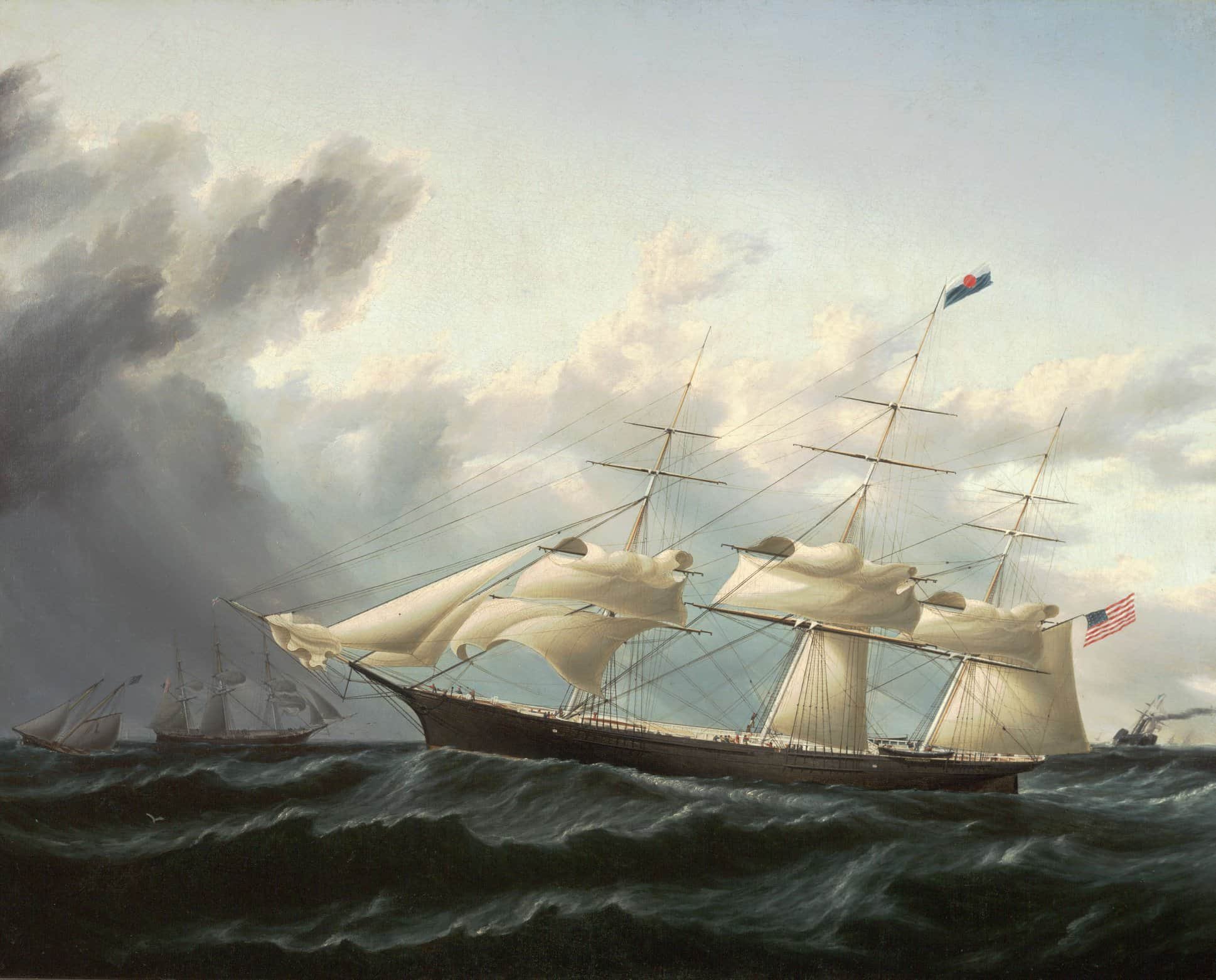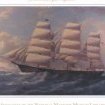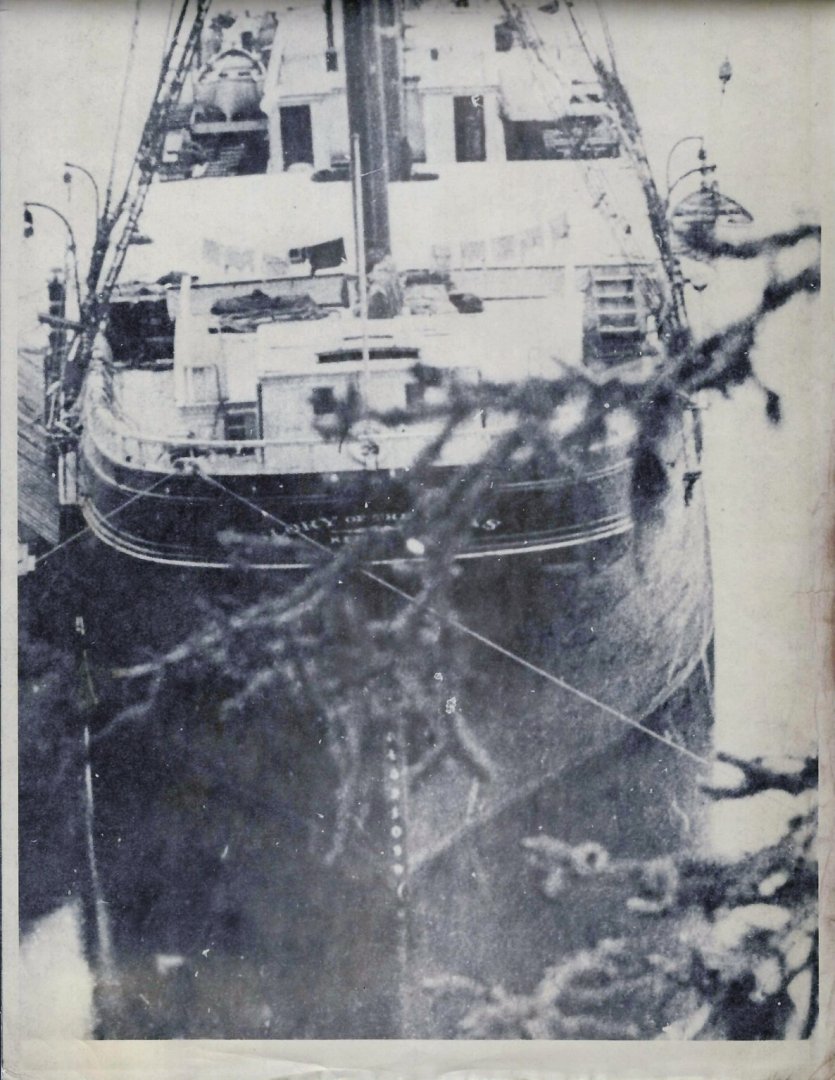-
Posts
2,152 -
Joined
-
Last visited
Content Type
Profiles
Forums
Gallery
Events
Everything posted by ClipperFan
-
Vladimir, the discovery I'm referring to is the vessel's width, which accommodates consistent walkways on either side of her rear house. In addition, the Wheelhouse, now established to be 15' across, looks smaller in the photo, reflecting a wider Stern than previously thought. Since we didn't get this particular image until both of your projects were well under way, nobody can be faulted for this oversight. It does however highlight how new discoveries help us to revise our thinking about McKay's vessels. This all points to an even more robust Stern Poop deck than previously thought before. Surprisingly it's still all very graceful when plotted out, as you'll see in my next sketch.
- 3,560 replies
-
- clipper
- hull model
-
(and 2 more)
Tagged with:
-
Rob, Vladimir back to more salient issues. This amazing and clear Stern image of Glory docked in Alaska gives us an even better opportunity than ever before to accurize Glory's dimensions from the Poop deck to the Stern quarters. Knowing accurate measurements of the rear Carriage House we can calculate the width of the walkways alongside. Utilizing a 15' width for the Wheelhouse we can also estimate quite accurately the width of the Stern, which has proven to be a genuine representation of McKay's "curvilinear" Stern section. I'm working on an accurate scale sketch of this section. It's too late to revise either of your models but it will help us all recognize the authentic appearance of a McKay Clipper for future reference.
- 3,560 replies
-
- clipper
- hull model
-
(and 2 more)
Tagged with:
-
Well, I guess we've just about "wrung" this topic out now.....
- 3,560 replies
-
- clipper
- hull model
-
(and 2 more)
Tagged with:
-
Rob, then again, it could just be a "spare bell".... you know, just in case one's lost or gets broken..... 😉
- 3,560 replies
-
- clipper
- hull model
-
(and 2 more)
Tagged with:
-
Rob, I agree, it's just uncanny how much the one peculiar image resembles a bell. It would be a major league inconvenience to mount a bell in such a place! 🙂
- 3,560 replies
-
- clipper
- hull model
-
(and 2 more)
Tagged with:
-
Rob, I agree but you have to also admit it sure has the shape of a bell
- 3,560 replies
-
- clipper
- hull model
-
(and 2 more)
Tagged with:
-
Rob, Whew, that's a relief about the book. I felt so bad when you said they were all sold out. It's an amazing Pictorial of the Packard. If you enlarge the Boy's House picture looking forward, there's a distinct half shape of a ship's bell behind the foremast. It would be an awkward place to put one but I can't figure out what else it could be.
- 3,560 replies
-
- clipper
- hull model
-
(and 2 more)
Tagged with:
-
Rob, then again, if the forecastle stanchions are 30" high, they could be about double the height of the lower forecastle bulkhead. That's if we figure those bulkheads are slightly beyond the sailor on his knees. By the way, did you ever get the book "Story of a Ship, the Benjamin F Packard" that I had sent to you? It should have arrived around the 11th. Don't worry about the cost, consider it a gift. I just want to make sure it arrived safely.
- 3,560 replies
-
- clipper
- hull model
-
(and 2 more)
Tagged with:
-
Rob, no critique intended, I was merely saying what I was observing after you directed me to that area of this amazing picture. Another fascination I have with this image is the apparent height of the Forecastle. The only logical way I can reconcile this much higher bulkhead is if the main deck had remained more level instead of following the molded level. Confusing to me at least.
- 3,560 replies
-
- clipper
- hull model
-
(and 2 more)
Tagged with:
-
Rob, very perceptive of you to find those. When I enlarged that image, I also saw the distinct shape of a ship's bell apparently mounted to the rear of the Foremast just above the long House behind it. To me, that's sort of an awkward position for one but it sure looks like a bell to me. I can see the metal stanchions you refer to, but it looks like two sets of wires rigged across them. One runs across the top and another runs just slightly above midway. More confusing still, is that the wires appear to run completely across the forecastle rear with no break for ladders. Speaking of which, I see lower Bulwarks on the Port side, with three equal sets of long rectangular moldings and a bearded sailor crouching down just to the right of them but no visible ladders. Do you think it's possible the crew might have moved them to work on the deck?
- 3,560 replies
-
- clipper
- hull model
-
(and 2 more)
Tagged with:
-
Rob, the forecastle rail is a nice touch. One I've never seen before on a McKay Clipper but which makes total sense from a safety factor. It looks like it's a wooden cross bar attached to iron stanchions. By the way, do you think maybe the center of this rail might be where the ship's bell might have been located?
- 3,560 replies
-
- clipper
- hull model
-
(and 2 more)
Tagged with:
-
Rob, being on the East Coast, it seems damn near impossible but some day, when she's fully rigged, I would love to see your Museum piece in person. I am sure she will be quite imposing.
- 3,560 replies
-
- clipper
- hull model
-
(and 2 more)
Tagged with:
-
Rob, this is really demonstrating how every spare inch of space was utilized on sailing Merchant vessels. Again, I believe this is shaping up to being your best most intricate modeling effort yet. This is getting more and more exciting daily.
- 3,560 replies
-
- clipper
- hull model
-
(and 2 more)
Tagged with:
-
Rob, thanks for sharing your creative process.
- 3,560 replies
-
- clipper
- hull model
-
(and 2 more)
Tagged with:
-
Rob, I hear you. You will have put an incredible amount of time and effort into your project by then. I don't even know if I would want to part with such a beautiful model by then. If you did though. I'm sure the logistics could be worked out.
- 3,560 replies
-
- clipper
- hull model
-
(and 2 more)
Tagged with:
-
Rob, mark my words. By the time you complete her lofty masts, powerful spars and intricate rigging like the 1877 scene of her at the San Francisco Wharf, she will indeed be a stunning Museum piece for the ages. Can't you just imagine her sitting serenely in front of the sole remaining "GLORY of the SEAS" nameboard? It could start a whole new generation rediscovering McKay's final magnificent Clipper!
- 3,560 replies
-
- clipper
- hull model
-
(and 2 more)
Tagged with:
-
Rob, these overall scenes are my favorites. You can really get a sense of how not one inch of space was wasted on these sailing merchant vessels. My guess is that a Chicken Coop would have been mounted on the forward hatch before the Foremast. This is just so exciting to see develop, it's like your creating a museum piece heirloom for the ages!
- 3,560 replies
-
- clipper
- hull model
-
(and 2 more)
Tagged with:
-
Rob, this is continuing to shape up as your most fascinating build to date! I love the intricate interactions of the turned stanchions on the cat walk compared to the ones on the Carriage House and Poop Deck. Just beautiful work. Even the tarps on the ship's boats look amazingly realistic, especially the simulated tie downs.
- 3,560 replies
-
- clipper
- hull model
-
(and 2 more)
Tagged with:
-
Rob, great catch on those house wall structures on the long house roof. Another answer we can see is that in both images, there are open window shutters on hinges on that same building. From the Boy's House forward, it appears like one has a broken hinge, as it hangs awkwardly. From the opposite scene, another silhouette of a open shutter appears to be open just fine. As far as solid vs built masts, maybe during tight financial times, they used solids and when affordable, converted to original built masts.
- 3,560 replies
-
- clipper
- hull model
-
(and 2 more)
Tagged with:
-
George beautifully impressive work on "Flying Fish" Rear Carriage House. I really appreciate the internal strengthening beams to support the Mizzen Mast mounting structure. A suggestion I have is to follow the dual arched windows located near the outer support brackets, as illustrated in the Buttersworth oil. It's more similar to actual photos of this facade we've seen in Glory then the more simplistic one in your plans. If you look at Michael Mjelde's illustration too, you'll see that for Glory, there were a series of arches which highlighted the ornateness of this house. If you want to get an idea of what a nice touch this is, just look at how the treatment of these facades really emphasize the beauty of Rob and Vladimir's vessels. I suspect this would have been a hallmark of all of McKay's Clipper Ships.
- 602 replies
-
- Flying Fish
- Model Shipways
-
(and 2 more)
Tagged with:
-
Rob, this is probably my most favorite feature of the modified Glory. Most Ships I've read about never seemed to have been so heavily revised as "GLORY of the SEAS." This section of your build is particularly fascinating.
- 3,560 replies
-
- clipper
- hull model
-
(and 2 more)
Tagged with:
-
Pat, Glory's weathered hull is intentional by Rob. His vessel is modeled after the image of her as she's seen docked in San Francisco with her lofty masts.
- 3,560 replies
-
- clipper
- hull model
-
(and 2 more)
Tagged with:
-
Rob, you always do such beautiful, clean work. I particularly like the two tone paint job on the arch for the rear boat skids, very nice touch.
- 3,560 replies
-
- clipper
- hull model
-
(and 2 more)
Tagged with:
About us
Modelshipworld - Advancing Ship Modeling through Research
SSL Secured
Your security is important for us so this Website is SSL-Secured
NRG Mailing Address
Nautical Research Guild
237 South Lincoln Street
Westmont IL, 60559-1917
Model Ship World ® and the MSW logo are Registered Trademarks, and belong to the Nautical Research Guild (United States Patent and Trademark Office: No. 6,929,264 & No. 6,929,274, registered Dec. 20, 2022)
Helpful Links
About the NRG
If you enjoy building ship models that are historically accurate as well as beautiful, then The Nautical Research Guild (NRG) is just right for you.
The Guild is a non-profit educational organization whose mission is to “Advance Ship Modeling Through Research”. We provide support to our members in their efforts to raise the quality of their model ships.
The Nautical Research Guild has published our world-renowned quarterly magazine, The Nautical Research Journal, since 1955. The pages of the Journal are full of articles by accomplished ship modelers who show you how they create those exquisite details on their models, and by maritime historians who show you the correct details to build. The Journal is available in both print and digital editions. Go to the NRG web site (www.thenrg.org) to download a complimentary digital copy of the Journal. The NRG also publishes plan sets, books and compilations of back issues of the Journal and the former Ships in Scale and Model Ship Builder magazines.




